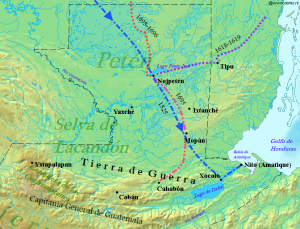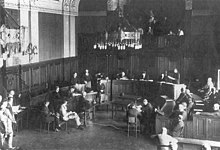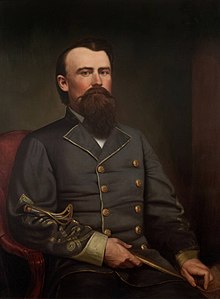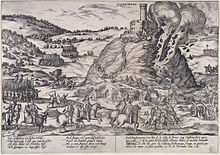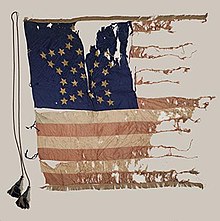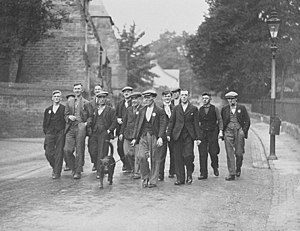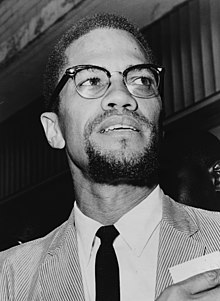Portal:History
The History Portal
History (derived from Ancient Greek ἱστορία (historía) 'inquiry; knowledge acquired by investigation') is the systematic study and documentation of the human past. History is an academic discipline which uses a narrative to describe, examine, question, and analyze past events, and investigate their patterns of cause and effect. Historians debate which narrative best explains an event, as well as the significance of different causes and effects. Historians debate the nature of history as an end in itself, and its usefulness in giving perspective on the problems of the present.
The period of events before the invention of writing systems is considered prehistory. "History" is an umbrella term comprising past events as well as the memory, discovery, collection, organization, presentation, and interpretation of these events. Historians seek knowledge of the past using historical sources such as written documents, oral accounts or traditional oral histories, art and material artifacts, and ecological markers.
Stories common to a particular culture, but not supported by external sources (such as the tales surrounding King Arthur), are usually classified as cultural heritage or legends. History differs from myth in that it is supported by verifiable evidence. However, ancient cultural influences have helped create variant interpretations of the nature of history, which have evolved over the centuries and continue to change today. The modern study of history is wide-ranging, and includes the study of specific regions and certain topical or thematic elements of historical investigation. History is taught as a part of primary and secondary education, and the academic study of history is a major discipline in universities.
Herodotus, a 5th-century BCE Greek historian, is often considered the "father of history", as one of the first historians in the Western tradition, though he has been criticized as the "father of lies". Along with his contemporary Thucydides, he helped form the foundations for the modern study of past events and societies. Their works continue to be read today, and the gap between the culture-focused Herodotus and the military-focused Thucydides remains a point of contention or approach in modern historical writing. In East Asia a state chronicle, the Spring and Autumn Annals, was reputed to date from as early as 722 BCE, though only 2nd-century BCE texts have survived. The title "father of history" has also been attributed, in their respective societies, to Sima Qian, Ibn Khaldun, and Kenneth Dike. (Full article...)
Featured picture
Did you know (auto generated)

- ... that although Ronteza slipped and fell chasing a cow in competition, she made Arabian horse history?
- ... that the 1892 Biddle vs. Livingstone football game was the first college football game ever played between historically black schools?
- ... that Songs and Flowers of the Wasatch represented a shift in Mormon history toward a "socially-accepted American cultural and religious heritage", according to historian Jennifer Reeder?
- ... that 25 Water Street was designed to blend in with historic brick buildings that no longer exist?
- ... that a travelling museum exhibition in Japan displays "life-size" renditions of Pokémon skeletons alongside the fossils of actual prehistoric animals?
- ... that officials said this year's Louisiana wildfire season includes the largest wildfire in the state's history?
Malcolm X (born Malcolm Little, later el-Hajj Malik el-Shabazz; May 19, 1925 – February 21, 1965) was an African American revolutionary, Muslim minister and human rights activist who was a prominent figure during the civil rights movement until his assassination in 1965. A spokesman for the Nation of Islam (NOI) until 1964, he was a vocal advocate for Black empowerment and the promotion of Islam within the African American community. A controversial figure accused of preaching violence, Malcolm X is also a widely celebrated figure within African American and Muslim communities for his pursuit of racial justice.
Malcolm spent his adolescence living in a series of foster homes or with relatives after his father's death and his mother's hospitalization. He committed various crimes, being sentenced to 8 to 10 years in prison in 1946 for larceny and burglary. In prison, he joined the Nation of Islam, adopting the name Malcolm X to symbolize his unknown African ancestral surname while discarding "the white slavemaster name of 'Little'", and after his parole in 1952, he quickly became one of the organization's most influential leaders. He was the public face of the organization for 12 years, advocating Black empowerment and separation of Black and White Americans, and criticizing Martin Luther King Jr. and the mainstream civil rights movement for its emphasis on non-violence and racial integration. Malcolm X also expressed pride in some of the Nation's social welfare achievements, such as its free drug rehabilitation program. From the 1950s onward, Malcolm X was subjected to surveillance by the Federal Bureau of Investigation (FBI). (Full article...)
On this day
- 1760 – The chapel of the newly constructed Castellania in Valletta, Malta, was consecrated.
- 1859 – Sponsored by Greek businessman Evangelos Zappas, the first modern revival of the Olympic Games took place in Athens.
- 1889 – Brazilian emperor Pedro II was overthrown in a coup led by Deodoro da Fonseca (pictured), while the country was proclaimed a republic.
- 1922 – During a general strike in Guayaquil, Ecuador, police and military fired into a crowd, killing at least 300 people.
- 1959 – Two men murdered a family in Holcomb, Kansas; the events became the subject of Truman Capote's non-fiction novel In Cold Blood, a pioneering work of the true crime genre.
- Madeleine de Scudéry (b. 1607)
- Sara Josephine Baker (b. 1873)
- Charles Thomson Rees Wilson (d. 1959)
- Margaret Mead (d. 1978)
Selected quote
Even death is not to be feared by one who has lived wisely.
— Gautama Buddha, founder of Buddhism
Related portals
More Did you know...
- ... that Giovanni de Ventura, a plague doctor who may have worn a beak doctor costume (pictured), was restricted by a covenant to treat only infectious patients? In the nose of the mask, there were types of plants that were used to filter the sickness from the wearer.
- ... that in some archaic Greek alphabets, an Ε could look like a Β, a Β like a C, a Γ like an Ι, an Ι like a Σ, or a Σ like an Μ?
- ... that the Chinese government has published a list of sixty-four important cultural relics that are forbidden to be exhibited outside of China?
- ... that the 1886 novel Albertine expedited the abolition of public prostitution in Norway?
- ... that Carl Sagan worked with the US Air Force on detonating a nuclear device on the Moon?
- ... that Olympic gold medals have been made out of silver, jade, and glass?
- ... that in 1945 a Japanese battalion was rearmed to serve alongside the British 5th Parachute Brigade in the Far East?
- ... that Solomon was accidentally castrated as an infant?
Topics
Categories

History • By period • By region • By topic • By ethnic group • Historiography • Archaeology • Books • Maps • Images • Magazines • Organizations • Fictional • Museums • Pseudohistory • Stubs • Timelines • Chronology • People • Wikipedia historians
WikiProjects
![]() WikiProject History •
Ancient Near East • Australian History • Classical Greece and Rome • Dacia • Former countries • History of Canada • Chinese history • European history • Heraldry and vexillology • Indian history • Jewish history • Medieval Scotland • Mesoamerica • Military history • Middle Ages • History of Science
WikiProject History •
Ancient Near East • Australian History • Classical Greece and Rome • Dacia • Former countries • History of Canada • Chinese history • European history • Heraldry and vexillology • Indian history • Jewish history • Medieval Scotland • Mesoamerica • Military history • Middle Ages • History of Science
WikiProject Time • Days of the Year • Years
WikiProject Biography • Composers • Political figures • Saints • United States Presidents
Things you can do
 |
Here are some tasks awaiting attention:
|
Associated Wikimedia
The following Wikimedia Foundation sister projects provide more on this subject:
-
Commons
Free media repository -
Wikibooks
Free textbooks and manuals -
Wikidata
Free knowledge base -
Wikinews
Free-content news -
Wikiquote
Collection of quotations -
Wikisource
Free-content library -
Wikiversity
Free learning tools -
Wiktionary
Dictionary and thesaurus






